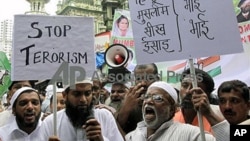For more than a year, some Shi'ite Muslim groups in India have expressed a desire to travel to Iraq to support Baghdad in its fight against Islamic State militants.
But after months of public appeals and court battles, the government last week said it will not allow it, because of the danger to citizens while there and the risks that could follow upon their return home.
In an affidavit released to the Delhi High Court, India’s Ministry of Home Affairs (MHA) said Indian citizens “could get radicalized, and on their return, could indulge in extremist activities in India, too.”
The affidavit read: “Allowing an Indian to go to another country to take part in a conflict, which amounts to taking part in terrorist activities, would lead to the allegation that the Indian government is promoting terrorism in other countries … It would therefore be in the national interest that every effort be made to prevent them from visiting Iraq.”
Other countries, including the United States, advise citizens against traveling to Iraq because of the danger and say they do not support those who go to fight the Islamic State. But there are no U.S. laws prohibiting helping governments or independent groups fighting against the Islamic State — as long as citizens do not provide support to groups considered terrorist organizations.
Controversies in India
The Indian government’s decision not to allow groups of mainly Shi'ite youths to travel to Iraq has been largely welcomed by security analysts and the Muslim community leaders in the country.
The government’s affidavit warned that participating in such conflicts abroad could result in greater tensions at home.
“Allowing any sect to take part in the conflict in Iraq/Syria would have had repercussions on other sects in India. This could directly result in sectarian conflict within India, which is not in the interest of the nation.”
Ajai Sahni, executive director of New Delhi-based Institute for Conflict Management, agreed that having Indians involved in a sectarian conflict abroad could inflame similar passions at home. But the government’s rationale is even broader.
“No Indian youth should be allowed to go anywhere in the world to fight sectarian and religious wars irrespective of the consequences on communal relations in India, simply because India does not support patterns of warlordism and irregular warfare in foreign countries,” Sahni told VOA.
Zafarul-Islam Khan, president of the All India Muslim Majlis-e-Mushawarat (AIMMM), a New Delhi-based umbrella body of Indian Muslim organizations, said as his group stands against Indians joining the Islamic State, it also opposes Indian citizens who seek to join the fight against the jihadist Sunni group.
“These people were going to a country which has been in a civil war kind of situation. If few people are drawn into the war, drawn into the conflict, become hostage, it will become a problem for the host country, become a problem for your own country,” said Khan.
In June 2014, IS militants took 39 Indian migrant workers as hostages in Iraq. India’s foreign minister Sushma Swaraj told reporters last week the Indian government believes the hostages are alive.
Protecting shrines in Iraq
Supporters of efforts to allow Indians to go to Iraq are continuing to speak out, despite the government’s ruling.
Mehmood Pracha is a Sunni member of a six-member team that planned to discuss with Iraqi officials ways that Indians could help.
“It was never a military mission at all. It was only for the purposes of undertaking humanitarian work. It predominantly contained doctors, nurses, engineers who were willing to provide medical support, reconstruction work, rehabilitation work in Iraq. And, that exactly was the core of our mission,” Pracha, a Supreme Court lawyer, told VOA.
Among India’s 175 million Muslims, about 45 million belong to Shi'ite sects whose leaders hold close ties with Iran and Iraq where their holiest shrines are located.
Last year Anjuman e Haideri (AeH), an Indian Shi'ite organization, announced that more than 100,000 youths belonging to the sect had voluntarily signed up to fly to Iraq “to defend the Shi'ite holy sites” from Islamic State attacks.
According to the group, Iraqi authorities agreed to receive the Indian volunteers, paving the way for a six-member delegation to travel to Iraq to discuss how the volunteers would work.
The trip never happened because India’s home ministry barred the delegation from traveling, prompting the court battle that led to the government’s affidavit.
AeH leaders say although the threat from the Islamic State against the holy shrines in Iraq has diminished in recent months, their volunteers remain eager to go to Iraq to provide humanitarian relief.




